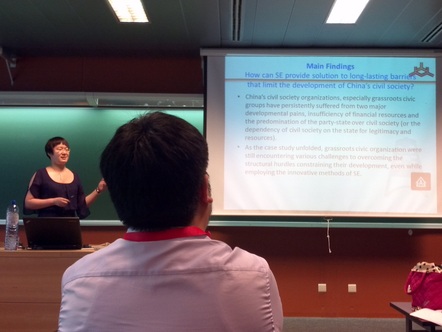 Almost a month ago I attended a conference on social entrepreneurship organized by the EMES network. Though the network already exists for quite a while, it seems to gain momentum in terms of its potential to deliver for sustainable development. A number of scientists have been working hard for over a decade now to bring thinking about the third sector to a different level. After studying a variety of contexts in Europe it seems the network is ready to expand worldwide and reach out to the far East and the deep South, bringing South-American and Asian perspectives into the equation. What is apparent though is that connections are made at the scientific level and not yet at societal level. Exchanges between academics are cautiously taking place between China, Taiwan, Korea and the Philippines. Politically not the best friends. However, the science connection seems to provide the safe space to connect and exchange in a non-threatening environment with much respect for each others challenges and local contexts. The safe space is partly there due to the absence of rather vocal international civil society organizations that could dominate the discourse. However, with social entrepreneurs now entering the scene, civil society elements may come in forcefully distorting the harmony while challenging academics to become more practical and apply the concepts to local policies and have them transformed into solid institutions. Right after the conference a new research program was launched: the ICSEM project, comparing social enterprise models from across the world. Experienced and young researchers as well as PhD students are invited to join in. The initiators of the project have done well in preserving interaction to researchers only, providing the required academic distance to the object of study. At the same time the results will be eagerly awaited for by policy makers that currently lack any decent theoretical framework about how and when to involve social entrepreneurs. Will the social economy provide an alternative to traditional civil society actors or is it an intrinsic part of it? Should civil society organizations reinvent themselves as social enterprises or should they breed them? Questions like these will need to be answered in the coming years to be able to see what and for whom social enterprises can deliver, and whether individual citizens are empowered or disempowered through their presence. Comments are closed.
|
About meMy name is Reinier van Hoffen. U®Reading
Click here for a summary.
Also find the text of a lecture Dr. Achterhuis held at the 2012 Bilderberg conference. Archives
August 2022
|
AddressNachtegaallaan 26
Ede, the Netherlands |
Telephone+31 (0)6 1429 1569
|
info@uraide.nl
|
 RSS Feed
RSS Feed
















